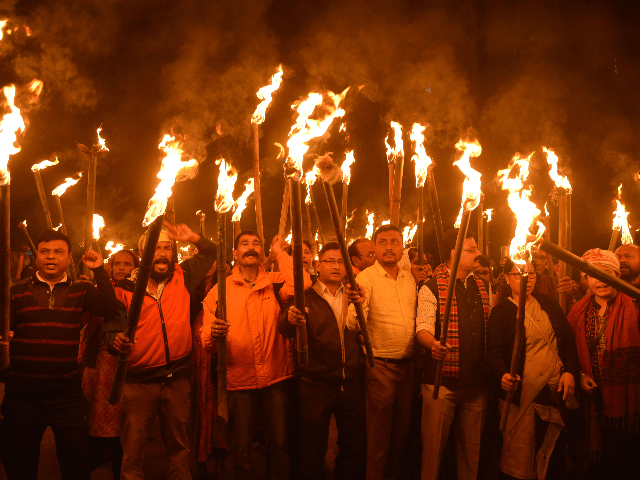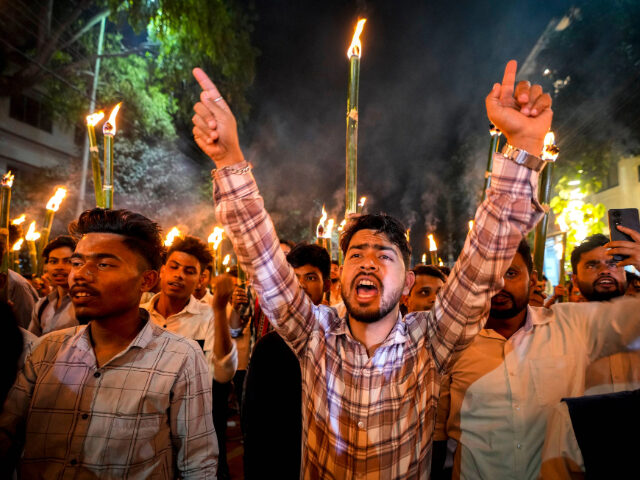The Indian government on Monday announced its plans to implement a controversial 2019 citizenship law that fast-tracks immigration for non-Muslims from three neighboring Muslim-majority nations.
India’s parliament ratified the Citizenship Amendment Act (CAA) in December 2019, sparking massive and violent protests by Muslims across the country, in addition to stern criticism from civil rights advocates and Indian opposition politicians who denounced the new law as blatantly discriminatory.

Krishak Mukti Sangram Samiti (KMSS) activists take part in a torchlight procession to protest against the government’s Citizenship Amendment Act in Guwahati on December 9, 2019. (BIJU BORO/AFP via Getty Images)
At least 31 people were killed during the protests, which continued for months despite a police ban on demonstrations and thousands of arrests. The government of Prime Minister Narendra Modi ultimately backed away from implementing the law, although it remained on the books.
Critics dismissed the CAA as a Hindu nationalist flex by Modi’s Bharatiya Janata Party (BJP) while advocates insisted the reasoning behind the law was sound and extended fast-track immigration to many groups besides Hindus.
The idea at the heart of the CAA was that religious minorities are not well-treated in the Islamist nations of Pakistan, Bangladesh, and Afghanistan, so non-Muslims from those countries should be given special consideration when they immigrate to India. Muslims living in those countries, on the other hand, cannot claim to be fleeing religious oppression, so they would not be granted fast-track immigration status.
One of the points raised by critics of the CAA is that Muslims of certain denominations are persecuted in majority-Muslim nations, as with Pakistan’s Ahmadis and Myanmar’s Rohingya. The CAA also does not offer citizenship to refugees from non-Muslim nations who have a substantial presence in India, such as the Tamil of Sri Lanka.
The Modi administration is also attempting to set up a National Register of Citizens to help identify illegal aliens. India’s 200 million Muslims fear the combination of this national registry with the CAA could make life very difficult for them. Civil rights groups fear that implementing the CAA will eliminate the last vestiges of a truly secular government from India.
Another increasingly vocal group of critics is worried that the BJP will trigger a massive influx of non-Muslim refugees from Pakistan, Bangladesh, and Afghanistan by offering citizenship, even if the current version of the law is only supposed to cover migrants who have been in India for a decade.
The opposition Congress party said on Monday that the sudden announcement of the CAA going into effect was “evidently designed to polarize the elections” along religious lines. The polarization will be especially acute because the major Muslim holiday of Ramadan is just beginning.
“The CAA has always been about creating two tiers of citizenships in India: non-Muslims and Muslims. It is voter polarization before elections, but are we surprised?” activist and protest leader Yogendra Yadav told Al Jazeera on Tuesday.
Another cynical explanation for the sudden reappearance of the CAA is that India’s Supreme Court just struck down as unconstitutional a scheme that allowed corporations to donate huge sums to political parties through “electoral bonds” without making full disclosures. The implementation of the CAA was announced within hours of the embarrassing Supreme Court ruling.
The rules announced on Monday included a religious test for prospective migrants, which coyly asks everyone other than Muslims to establish their religious bona fides — much as the CAA does not explicitly say “no Muslims need apply” but stipulates that its special immigration procedures are available to Hindus, Parsis, Sikhs, Buddhists, Jains, and Christians, every major regional faith except Islam.
An online portal will be established where migrants who belong to one of the listed faiths and entered India before December 31, 2014, can apply for citizenship. Those opposed to the law worry that the next logical step, rounding up and deporting Muslims, would be explosive.
Indian Home Affairs Minister Amit Shah said on Monday that implementing the CAA means Modi has “delivered on another commitment and realized the promise of the makers of our constitution to the Hindus, Sikhs, Buddhists, Jains, Parsis and Christians living in those countries.”
“This act is only for those who have suffered persecution for years and have no other shelter in the world except India,” the Home Affairs Ministry said.
Modi’s BJP followed up with the celebratory social media hashtag #JoKahaSoKiya, which means “We Did What We Said.”
Protests again flared up across India after the announcement, including a call for a national shutdown by the All Assam Students’ Union (AASU), a major player in the 2019 protests.
Demonstrations were held in Assam and Kerala states on Monday and Tuesday, under the watchful eyes of police and paramilitary units. A heavy police presence was also noted on the streets of Delhi.
Al Jazeera News reported a protest at the Jamia Millia Islamia University in New Delhi on Monday, with similar demonstrations planned at schools in other states throughout the week.
“The government timed it like an ace. Everyone around us is busy planning for Ramadan, and the news came out of nowhere,” a student protester in New Delhi grumbled.

COMMENTS
Please let us know if you're having issues with commenting.